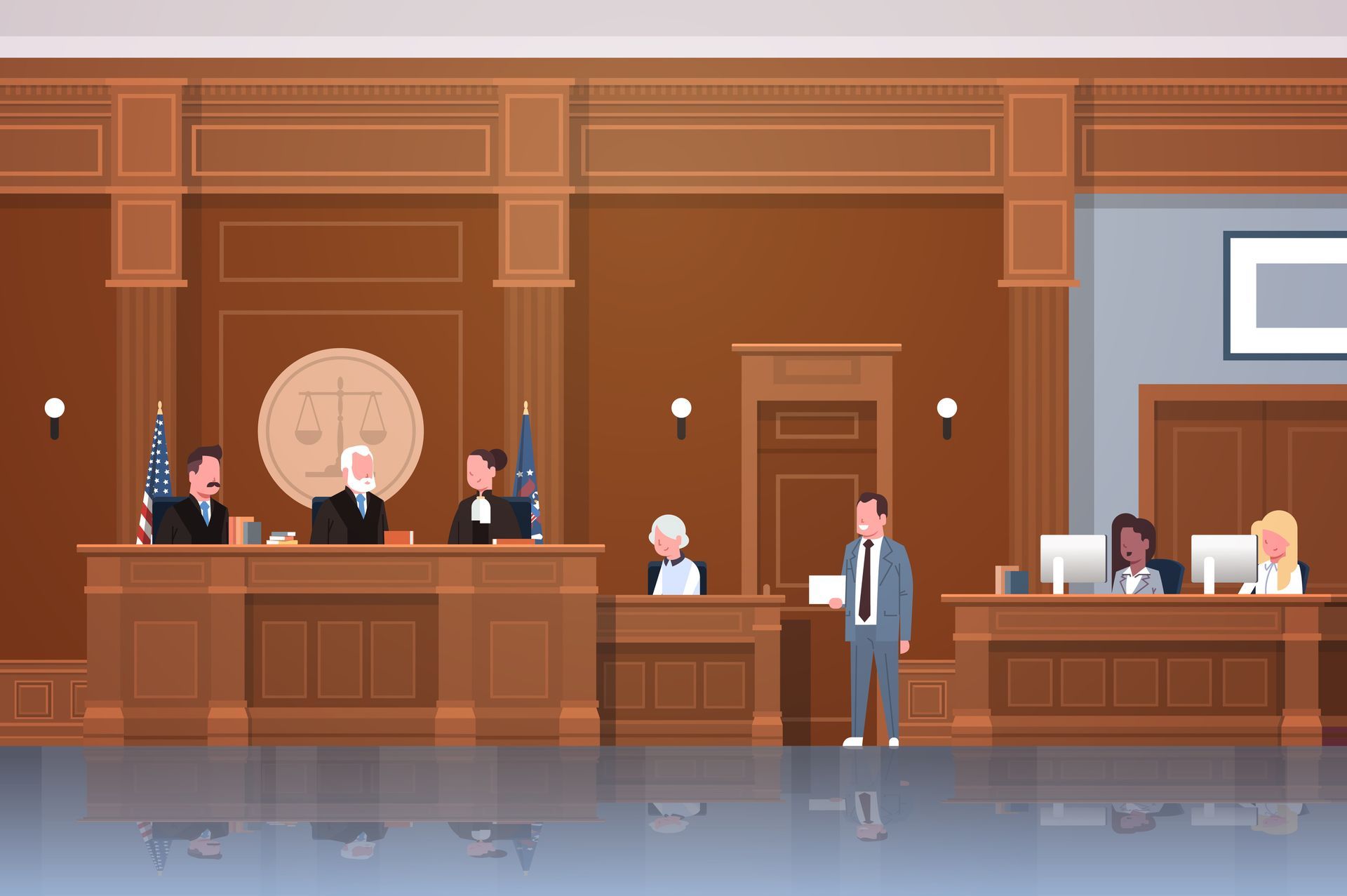mail: info@raftersolicitors.ie Emergency Contact Number: +353 (0)86 8764144

THE DISTRICT COURT

DISTRICT COURT TERMINOLOGY
- This Language used in the District Court can be confusing and we are here to provide you with a helpful guide of the words you are likely to come across.
Defendant & Accused
The person who is charged or summonsed in relation to the alledged complaint before the court.
Summons/Charge Sheet
A summons is mechanism by which you are notifed to appear in court in respect of an alledged complaint, you can be served in person or by registered post.
A charge sheet is a document produced by An Garda Síochána containing details of the offence with which a defendant has been arrested and charged.
Prosecution
This is the text area for this paragraph. To change it, simply click and start typing. Once you've added your content, you can customize it.
Bail & Bail Bond
Bail is the temporary release of a defendant awaiting trial, sometimes with conditions such as surrendering a passport or reporting regularly to the Garda Station to Sign on.
You enter into you Bail Bond which is essentially your 'promise' to the court to abide by the conditions of bail- you will usually be given a copy upon leaving court.
Remand/Adjournment
The word remand means to 'commit' and it applies in the context of the Charge Sheet procedure whereby an accused person may be remanded in custody or bail to the next sitting of the court.
( *There are statutory timelines on remands which will be discussed below)
Warrant /Bench Warrant
A warrant is a court order issued by a judge providing the Garda Síochána with the arrest or search of a person or property.
A bench Warrant is issued by the Court if you do not appear at your scheduled court date.
Plea in Mitigation
A plea in mitiagtion is given on behalf of an accused person following an acceptance of guilt. The Plea will be delivered to the court by your solicitor and will outline your personal circumstances to the court.
Sentencing
The process whereby the judge imposes a punishment or penalty on the accused person who has been found guilty.
Probation
A period of supervision imposed as an alternative to imprisonment, allowing the accused persoj to retain his/her liberty under specific conditions.
Community Service Order
This an alternative to imprisonment where the defendant is required to perform unpaid work for the benefit of the community.
Fine
Certain District Court offences contain a monetary provision. If you are found guilty a fine may be imposed in accordance with the offence and your means.
Recognisance /Appeal
At the end of the case and a finding of guilt your solicitor may ask that the court 'fix recognisance'. Recognisance must be set by the lower court in the event that you wish to appeal the matter.
The recognisance set may be a sum of money and again is similar to the bail bond there is an underaking to attend the next court sitting.
You are entitled to appeal the district court order to the Circuit Court, you only have a 14 day period in which to appeal the order.
ATTENDING THE DISTRICT COURT
-
1. CHARGE SHEET OR SUMMONS
Charge Sheet Procedure
This procedure is used in generally the following circumstances:
1. Accused is arrested and brought to the Garda Station and subsequently released on station bail
2. Arrested without a warrant, refused station bail, and immediately brought to court
3. The accused is arrested on a warrant and brought to Court
4. The Accused appears on remand before the court and further charges may be preferred on additional charge sheets.
Order 17 of the District Court rules set out the 'particulars' to be set out in the charge sheet which are the prosecutor, the accused, the address, the charge, and the District Court
Summons Procedure
A summons may be issued under the following state
1. The Petty Sessions(Ireland) Ac 1851
2. Issuing of A summons under the Courts (NO.3) Act 1986
Section 10(4) of the Petty Sessions Act provides a time limit of six months for the institutions of proceedings from the date of the commission of the offence.
In Ireland, the majority of summons are issued by Gardai under the Courts Act 1983
-
2. ATTENDING COURT
If you are due to appear before the District Court it is advisable to contact your lawyer in advance of the Court date.
If you are unable to attend court on account of illness or for some other reason you must contact your lawyer to represent you in your absence and provide any evidence of your illness or reason for absence.
-
3.JURISDICTION OF THE DISTRICT COURT
The District Court is a court of summary jurisdiction, this means the District Court deals with non-jury trial of persons charged with 'minor offences'.
What sets out a minor offense depends upon( amongst other factors) the severity or seriousness of the penalty.
The District Court:
1. Summary(only) offences;
2.'Hybrid' offences
3. Indictable offences that can be tried summarily
4. Indictable offences dealt with on a guilty plea only.
-
4. SENTENCING
Most offences before the District Court carry a potential fine, a short term of imprisonment or in some cases both.
The maximum sentence an accused person can receive in the District Court is 12 months.
However it should be noted that where an accused person has consecutive sentences the aggregate cannot exceed 24 months.
-
5. APPEAL
An accused person has 14 days to appeal a matter to the Circuit Court
For driving matters where a disqualifiaction has been
The appeal is 'de novo' which means that it is a full new hearing of the matter, all questions of law and fact are open to review.
If you pleaded guilty in the District Court and intend to plead not guilty in the Circuit Court
District Court Offences
Drug Offences
Drug Driving
Theft and Fraud
Drink Driving Offences
Criminal Damage Offences
Assault Offences
Domestic Violence Offences
Public Order Offences
Firearms Offences
DISTRICT COURT FAQ
Q - I have stopped by Gardai and searched for possession of drugs, are the Gardai allowed to search me without my consent?
If you are stopped by the Gaurds for the purposes of a search under the Section 23 of the the Misuse of Drugs Act 1977, the Gardai must have formed a 'reasonable supicion' to engage in any search.
What is deemed a reasonable supicion is inferred from the circumstances.
Lets take a look at some examples!
If you are in a park and there is a strong smell of cannabis emanating from the park bench your sitting on and nobody else in in sight, it may be the case the Gardai have formed a reasonable suspicion to carry out a search.
It is inferred from the circumstance i.e based on the smell of cannabis and and the fact that there is nobody else in the park.
However, if you are walking through an area that is know to Gardai to have a 'drug problem' and Gardai proceed to search you due to your mere precence in the area, this is not a reasonably held suspicion. ( DDP v Farrell [2009] IEHC 368)
However, its not always black and white, lets take a look at the next example,
Your with your freind Joey who is cool and has been up in court a few times for possession of weed. You come across Gardai and Joey does a runner through the trees, the Gardai appoach you and intend to carry out a search.
Has a reasonable suspicion been formed ?
In this case, if it is the case whereby you have stayed and spoke to the Gaurds you may entitled to refuse a search.
However if you have followed Joey through the trees and subsequetly ran out of breath then the Gardai are entitled to search you and potentially effect an arrest on account of your ' supicious actions'.
Ever case is different and turns on its own unique set of facts!
Q- I was out last night and involved in a row at my local pub, i cannot remember the incident, the Gaurd said something about an Adult Caution, What should I do?
The first thing you need to do is to contact your solicitor who can advise you and make contact with the Garda Station.
It is not advisable to attend the Garda Station without first obtaining independant legal advise.
It may be the case that you have recieved merely an ADULT CAUTION and there will be no more of the matter.
The Garda Adult Cautioning Scheme allows the Gardai to administer a caution in respect of certain offences to persons aged 18 years or upwards.
This is essentially a 'slap on the wrist' , it will not show on your Garda Vetting however it will show on your court record should you come to the attention of the Court if you are subsequently convicted of a different criminal offence.
In order to recieve the benefit of an adult caution you must the criteria which is outlined in the Scheme and focuses on the following:
- There must be evidence of the accused's guilt
- You must admit to the offence
- You must understand the nature of the Caution
- You must give informed consent to the caution
There is a schedule of offences whereby an adult caution can arise, the scheduel deals with offences under the following statutes
- The Public Order Act 1994
- Criminal Justice(Theft and Fruad Offences) Act 2001
- Section 2 of the Non Fatal Offences Agaisnt the Person Act 1997
- Criminal Damage Act 1991
- Dublin Act 1842
- Intoxicating Liquor Act 1927
- Intoxicating Liquor Act 2003
- Licensing Act 1872
Possesion of cannabis and other offences were added to the Adult Caution Schedule on the 14th of December 2020.
We must keep in mind that this is applicable to cannabis only and the adult caution scheme is not applicable to other types of controlled drugs like cocaine, ketamine, ecstasy and heroin.
Q - Its my first offence and I want to travel to America for my gap year, will a criminal conviction effect my ability to travel and is there any way to avoid this?
There are indeed strict rules upon entering the United States and people have been refused entry on account of their previous convictions.
A District Court judge does indeed have discretion as to whether to leave an accused without a conviciton, however this discretion is excercised sparingly.
There are a number of options for accused persons without a conviciton, this may be in the form of a donation to the Court Box. The amount of donation depends on the circumstances of the case, and upon the advice of your solicitor.
Similarly the Probation of Offenders Act 1907 gives the District Court power to dismiss a charge or discharge an offender conditionally on entering a recognisance.
The Probation Act is a fundamental statute in the District Court as it allows the Court to deal with first time offenders without leaving them with the impact of a conviction.
Your Solicitor will address the Court as to the reasons you should be left without a convtion, this is know in the legal world as a 'plea in mitigation'.
Book a Consultation
Sound legal advice is based on years of training, hard work, and passion, as well as familiarity with legislation and precedent and sound consideration. You’ll find all that and more at Rafter Solicitors.
Thank you for contacting us.
We will get back to you as soon as possible
If the matter is urgent please call our emergency number on 0868764144
Please try again later
About Us
Serving our clients with diligence, passion and hardwork

Contact Info
26 James Street, Co Kilkenny,
Ireland
Telephone: +353 (0)56 7800089
24 Hour Emergency: +353 (0)86 8764144
info@raftersolicitors.ie